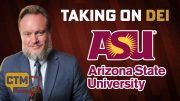
Andrew Duncomb (shown) is a huge supporter of the Confederate “battle flag,” and even organized a rally for its support at the Capitol building in Oklahoma, drawing around 80-90 people.
That in itself is not surprising, since Oklahoma is a southern state. In fact, when Oklahoma was “Indian Territory,” all the American Indian tribal governments signed treaties with the Confederate States of America, and fought in several battles inside the present borders of the state. Several weeks after Robert E. Lee surrendered the Army of Northern Virginia, Confederate Indian Stand Watie was the last Confederate general to surrender, on June 23, 1865.
What surprised many about Duncomb’s protest is that he is a black Oklahoman, who calls himself the “Black Rebel.”
“We don’t believe it’s a symbol of racism,” Duncomb said of those who were with him in support of the Confederate flag. “They’re blaming the racist problems on the flag and not on the real problems of America,” Duncomb told Oklahoma media. “Look at these people,” Duncomb said, pointing at the Capitol protesters. “They all followed the black guy out here. Do you think any of them are racists?”
Duncomb countered the arguments of a counter-protester, who insisted that the flag “represents hate.” Defending his fellow supporters of the Confederate flag, Duncomb responded, “I’m letting you know that all these people out here right here do not believe it’s about hate, they believe it’s about heritage.”
When news about the “Black Rebel” went national, The New American decided to ask Duncomb for an elaboration of his motivations in supporting the flag, regarded by many as a symbol of hatred toward African-Americans like Duncomb.
Duncomb told us that we “need to deal with the heart of the problem, not go off on an object.” He contended that the flag is more about Southern pride and heritage, although conceding that there are some who do use it as a racist symbol. He rejected the contention of those who say the South is equivalent to racism.
“I have lived in Oklahoma most of my life. This is how we live out here — we want to be left alone. We don’t want the government telling us how to run our lives,” adding “we don’t want to be slaves of the government.”
Noting that he is not an anti-government person, he believes the flag represents the rebel spirit that citizens need to have when “government oversteps the Constitution.” That is why he calls himself the “Black Rebel,” because he believes it is time for the people to push back against the government having too much power.
Turning his remarks to the approach the news media has taken on the flag controversy, he lamented that they had made it out as though it was the fault of the flag, instead of the action of some “crazy, messed-up person.” After all, Duncomb said, “What if it were the American flag?” that Dylan Roof had been pictured with. “Would they want to ban the American flag? Can you blame an object?”
Duncomb compared the controversy to the dispute over the placing of the Ten Commandments on the grounds of the state capitol. For some folks, Duncomb said, the Ten Commandments monument is “offensive.” (See “Okla. Gov Defies State Court Order to Remove 10 Commandments Monument.”) He then offered other examples, such as the ouster of the Bible and prayer from the public schools, because that was “offensive.” Others consider the phrase, “one nation under God” in the flag salute as offensive, Duncomb added.
America has some “dark history,” Duncomb conceded, but it “also has some things which are really good.” He believes history is important, but it should not be misused to keep us from moving forward here in the present. To Duncomb, the proper use of history is for those “dark” things in history to be “not forgotten, but forgiven.”
When President Barack Obama arrived in Durant, Oklahoma, on Wednesday, he was met with citizens waving the Confederate flag. One woman, identified as Alyssa, said the protest had “nothing to do” with Obama, but was rather about the events of the past few weeks. “This is our heritage,” said another woman, identified as Stephanie.
Angel Pride of Texas said, “Those men that died for the Confederate flag that flew while they were fighting, they’re just as much veterans as our veterans are today who are flying this flag.”
Congressman Tom Cole expressed disagreement with the actions of those who waved the flag during the president’s visit. Cole, a Republican who represents Oklahoma in the House of Representatives, said he was “shocked and disappointed by those who showed up to wave Confederate flags soon after President Obama arrived in Oklahoma.” Cole, who scored 50 percent on the latest Freedom Index, published by The New American magazine, added, “Their actions were not only disappointing but incredibly disrespectful, insensitive and embarrassing to the entire state. The office of President of the United States is deserving of the respect of all Americans, regardless of how deeply we may disagree on issues or policies.”
One suspects that the controversy over the Confederate flag has not ended, and the Black Rebel — Andrew Duncomb — may also be heard from again. When I asked if he had considered a run for public office, he laughed and said, “Some have mentioned that.” But for now, his cause is the recognition of the Confederate flag, not as a racist symbol, but its use as a symbol of resistance to government which has overstepped its constitutional bonds.




